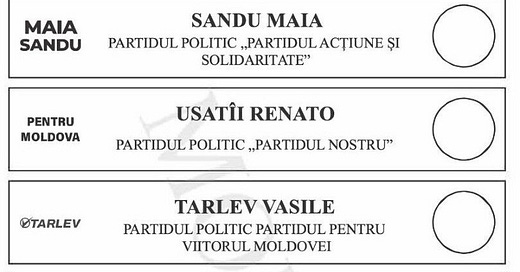In today’s Perspective article I’m sharing my thoughts on the stakes of this election, some of the possible twists and turns in the coming week and analysis of possible outcomes. As with other articles in the Perspective series this will be a mix of (hopefully informed) opinion and analysis and will be available to paying subscribers with a short preview for all readers.
With one week to go before Moldova’s October 20th presidential election and constitutional referendum on joining the European Union the stakes feel very high in Moldova. Campaigning is in full swing and efforts at election interference by the Kremlin via Ilan Shor and others are at a fever pitch. Today I want to step back and take a broader look at the stakes of the election, the reasons for the referendum and what various outcomes could mean for Moldova.
The Referendum - Why Now?
This question is probably the single most contentious issue in the election campaign. Countries seeking to join the EU may hold referendums asking citizens to weigh in on the decision, but sometimes they simply make the decision in their parliaments. In the cases where referendums are held though, they are always at the end of the negotiation process immediately before the nation ratifies the treaties and joins the block.
So why is Moldova holding a referendum now? At the very beginning of the negotiation process?
Pro-Russian opposition parties have repeatedly attacked the scheduling of the referendum at the same time as the presidential elections as a scheme to garner more votes for Maia Sandu. This line has been picked up by multiple “nominally” pro European opposition politicians who have argued that because the timing is suspect (in their view) the whole process is illegitimate and therefore people should not support the referendum. This allows politicians who were very recently running for office promoting pictures of themselves standing next to Putin to claim to be pro-EU while still opposing the referendum. It’s a type of linguistic Jujutsu that casually sidesteps the consequences of a “No” vote - a topic we’ll get to more below.
I don’t believe that this referendum was scheduled to support President Sandu’s re-election bid. I think that it was a gamble driven by a different impulse and strategy.



